(ii) Analyse the effect of delaying the sale of the business of the Stiletto Partnership to Razor Ltd until30 April 2007 on Clint’s income tax and national insurance position.You are not required to prepare detailed calculations of his income tax or natio
题目
(ii) Analyse the effect of delaying the sale of the business of the Stiletto Partnership to Razor Ltd until
30 April 2007 on Clint’s income tax and national insurance position.
You are not required to prepare detailed calculations of his income tax or national insurance liabilities.
(4 marks)
相似考题
参考答案和解析
(ii) The implications of delaying the sale of the business
The implications of delaying the sale of the business until 30 April would have been as follows:
– Clint would have received an additional two months of profits amounting to £6,920 (£20,760 x 1/3).
– Clint’s trading income in 2006/07 would have been reduced by £13,015 (£43,723 – £30,708), much of which
would have been subject to income tax at 40%. His additional trading income in 2007/08 of £19,935 would all
have been taxed at 10% and 22%.
– Clint is entitled to the personal age allowance of £7,280 in both years. However, it is abated by £1 for every £2
by which his total income exceeds £20,100. Once Clint’s total income exceeds £24,590 (£20,100 + ((£7,280
– £5,035) x 2)), his personal allowance will be reduced to the standard amount of £5,035. Accordingly, the
increased personal allowance would not be available in 2006/07 regardless of the year in which the business was
sold. It is available in 2007/08 (although part of it is wasted) but would not have been if the sale of the business
had been delayed.
– Clint’s class 4 national insurance contributions in 2006/07 would have been reduced due to the fall in the level
of his trading income. However, much of the saving would be at 1% only. Clint is not liable to class 4 national
insurance contributions in 2007/08 as he is 65 at the start of the year.
– Changing the date on which the business was sold would have had no effect on Clint’s class 2 liability as he is
not required to make class 2 contributions once he is 65 years old.

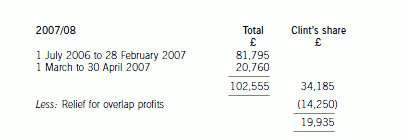
更多“(ii) Analyse the effect of delaying the sale of the business of the Stiletto Partnership to Razor Ltd until30 April 2007 on Clint’s income tax and national insurance position.You are not required to prepare detailed calculations of his income tax or natio”相关问题
-
第1题:
3 On 1 January 2007 Dovedale Ltd, a company with no subsidiaries, intends to purchase 65% of the ordinary share
capital of Hira Ltd from Belgrove Ltd. Belgrove Ltd currently owns 100% of the share capital of Hira Ltd and has no
other subsidiaries. All three companies have their head offices in the UK and are UK resident.
Hira Ltd had trading losses brought forward, as at 1 April 2006, of £18,600 and no income or gains against which
to offset losses in the year ended 31 March 2006. In the year ending 31 March 2007 the company expects to make
further tax adjusted trading losses of £55,000 before deduction of capital allowances, and to have no other income
or gains. The tax written down value of Hira Ltd’s plant and machinery as at 31 March 2006 was £96,000 and
there will be no fixed asset additions or disposals in the year ending 31 March 2007. In the year ending 31 March
2008 a small tax adjusted trading loss is anticipated. Hira Ltd will surrender the maximum possible trading losses
to Belgrove Ltd and Dovedale Ltd.
The tax adjusted trading profit of Dovedale Ltd for the year ending 31 March 2007 is expected to be £875,000 and
to continue at this level in the future. The profits chargeable to corporation tax of Belgrove Ltd are expected to be
£38,000 for the year ending 31 March 2007 and to increase in the future.
On 1 February 2007 Dovedale Ltd will sell a small office building to Hira Ltd for its market value of £234,000.
Dovedale Ltd purchased the building in March 2005 for £210,000. In October 2004 Dovedale Ltd sold a factory
for £277,450 making a capital gain of £84,217. A claim was made to roll over the gain on the sale of the factory
against the acquisition cost of the office building.
On 1 April 2007 Dovedale Ltd intends to acquire the whole of the ordinary share capital of Atapo Inc, an unquoted
company resident in the country of Morovia. Atapo Inc sells components to Dovedale Ltd as well as to other
companies in Morovia and around the world.
It is estimated that Atapo Inc will make a profit before tax of £160,000 in the year ending 31 March 2008 and will
pay a dividend to Dovedale Ltd of £105,000. It can be assumed that Atapo Inc’s taxable profits are equal to its profit
before tax. The rate of corporation tax in Morovia is 9%. There is a withholding tax of 3% on dividends paid to
non-Morovian resident shareholders. There is no double tax agreement between the UK and Morovia.
Required:
(a) Advise Belgrove Ltd of any capital gains that may arise as a result of the sale of the shares in Hira Ltd. You
are not required to calculate any capital gains in this part of the question. (4 marks)
正确答案:
(a) Capital gains that may arise on the sale by Belgrove Ltd of shares in Hira Ltd
Belgrove Ltd will realise a capital gain on the sale of the shares unless the substantial shareholding exemption applies. The
exemption will be given automatically provided all of the following conditions are satisfied.
– Belgrove Ltd has owned at least 10% of Hira Ltd for a minimum of 12 months during the two years prior to the sale.
– Belgrove Ltd is a trading company or a member of a trading group during that 12-month period and immediately after
the sale.
– Hira Ltd is a trading company or the holding company of a trading group during that 12-month period and immediately
after the sale.
Hira Ltd will no longer be in a capital gains group with Belgrove Ltd after the sale. Accordingly, a capital gain, known as a
degrouping charge, may arise in Hira Ltd. A degrouping charge will arise if, at the time it leaves the Belgrove Ltd group, Hira
Ltd owns any capital assets which were transferred to it at no gain, no loss within the previous six years by a member of the
Belgrove Ltd capital gains group. -
第2题:
(b) Compute Gloria’s total income tax and national insurance liability for 2006/07. (7 marks)
正确答案: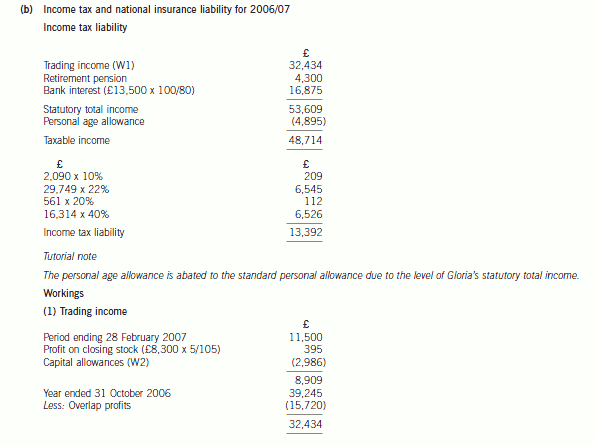
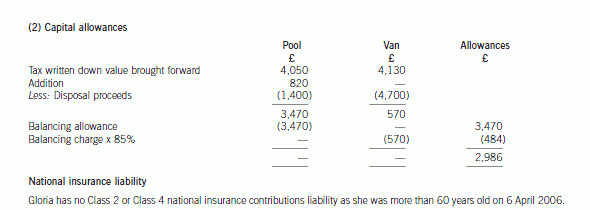
-
第3题:
(b) For this part, assume today’s date is 1 May 2010.
Bill and Ben decided not to sell their company, and instead expanded the business themselves. Ben, however,
is now pursuing other interests, and is no longer involved with the day to day activities of Flower Limited. Bill
believes that the company would be better off without Ben as a voting shareholder, and wishes to buy Ben’s
shares. However, Bill does not have sufficient funds to buy the shares himself, and so is wondering if the
company could acquire the shares instead.
The proposed price for Ben’s shares would be £500,000. Both Bill and Ben pay income tax at the higher rate.
Required:
Write a letter to Ben:
(1) stating the income tax (IT) and/or capital gains tax (CGT) implications for Ben if Flower Limited were to
repurchase his 50% holding of ordinary shares, immediately in May 2010; and
(2) advising him of any available planning options that might improve this tax position. Clearly explain any
conditions which must be satisfied and quantify the tax savings which may result.
(13 marks)
Assume that the corporation tax rates for the financial year 2005 and the income tax rates and allowances
for the tax year 2005/06 apply throughout this question.
正确答案:(b) [Ben’s address] [Firm’s address]
Dear Ben [Date]
A company purchase of own shares can be subject to capital gains treatment if certain conditions are satisfied. However, one
of these conditions is that the shares in question must have been held for a minimum period of five years. As at 1 May 2010,
your shares in Flower Limited have only been held for four years and ten months. As a result, the capital gains treatment will
not apply.
In the absence of capital gains treatment, the position on a company repurchase of its own shares is that the payment will
be treated as an income distribution (i.e. a dividend) in the hands of the recipient. The distribution element is calculated as
the proceeds received for the shares less the price paid for them. On the basis that the purchase price is £500,000, then the
element of distribution will be £499,500 (500,000 – 500). This would be taxed as follows: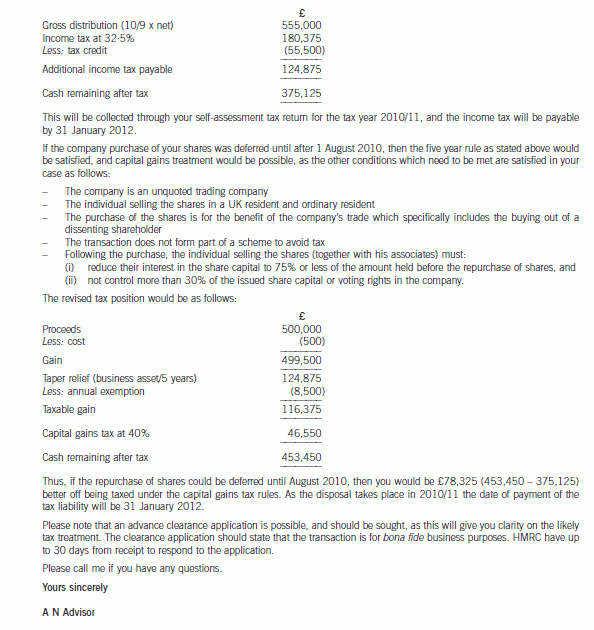
-
第4题:
(ii) The UK value added tax (VAT) implications for Razor Ltd of selling tools to and purchasing tools from
Cutlass Inc; (2 marks)
正确答案:
(ii) Value added tax (VAT)
Goods exported are zero-rated. Razor Ltd must retain appropriate documentary evidence that the export has taken place.
Razor Ltd must account for VAT on the value of the goods purchased from Cutlass Inc at the time the goods are brought
into the UK. The VAT payable should be included as deductible input tax on the company’s VAT return. -
第5题:
(c) Calculate and explain the amount of income tax relief that Gerard will obtain in respect of the pension
contributions he proposes to make in the tax year 2007/08 and contrast this with how his position could be
improved by delaying some of the contributions that he could have made in 2007/08 until 2008/09. You
should include relevant supporting calculations and quantify the additional tax savings arising as a result of
your advice.
You should ignore the proposed changes to the bonus scheme for this part of this question and assume that
Gerard’s income will not change in 2008/09. (12 marks)
正确答案:


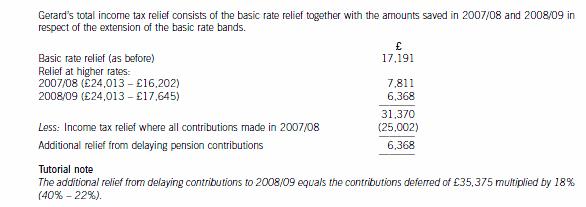
-
第6题:
4 Coral is the owner and managing director of Reef Ltd. She is considering the manner in which she will make her first
pension contributions. In November 2007 she inherited her mother’s house in the country of Kalania.
The following information has been extracted from client files and from telephone conversations with Coral.
Coral:
– 1972 – Born in the country of Kalania. Her father, who died in 2002, was domiciled in Kalania.
– 1999 – Moved to the UK and has lived and worked here since then.
– 2001 – Subscribed for 100% of the ordinary share capital of Reef Ltd.
– Intends to sell Reef Ltd and return to live in the country of Kalania in 2012.
– No income apart from that received from Reef Ltd.
Reef Ltd:
– A UK resident company with annual profits chargeable to corporation tax of approximately £70,000.
– Four employees including Coral.
– Provides scuba diving lessons to members of the public.
Payments from Reef Ltd to Coral in 2007/08:
– Director’s fees of £460 per month.
– Dividends paid of £14,250 in June 2007 and £14,250 in September 2007.
Pension contributions:
– Coral has not so far made any pension contributions in the tax year 2007/08 but wishes to make gross pension
contributions of £9,000.
– The contributions are to be made by Reef Ltd or Coral or a combination of the two in such a way as to minimise
the total after tax cost.
– Any contributions made by Coral will be funded by an additional dividend from Reef Ltd.
House in the country of Kalania:
– Beachfront property with potential rental income of £550 per month after deduction of allowable expenditure.
– Coral will use it for holidays for two months each year.
The tax system in the country of Kalania:
– No capital gains tax or inheritance tax.
– Income tax at 8% on income arising in the country of Kalania.
– No double tax treaty with the UK.
Required:
(a) With the objective of minimising the total after tax cost, advise Coral as to whether the gross pension
contributions of £9,000 should be made:
– wholly by Reef Ltd; or
– by Coral to the extent that they are tax allowable with the balance made by Reef Ltd.
Your answer should include supporting calculations where necessary. (9 marks)
正确答案:
-
第7题:
5 Crusoe has contacted you following the death of his father, Noland. Crusoe has inherited the whole of his father’s
estate and is seeking advice on his father’s capital gains tax position and the payment of inheritance tax following his
death.
The following information has been extracted from client files and from telephone conversations with Crusoe.
Noland – personal information:
– Divorcee whose only other relatives are his sister, Avril, and two grandchildren.
– Died suddenly on 1 October 2007 without having made a will.
– Under the laws of intestacy, the whole of his estate passes to Crusoe.
Noland – income tax and capital gains tax:
– Has been a basic rate taxpayer since the tax year 2000/01.
– Sales of quoted shares resulted in:
– Chargeable gains of £7,100 and allowable losses of £17,800 in the tax year 2007/08.
– Chargeable gains of approximately £14,000 each tax year from 2000/01 to 2006/07.
– None of the shares were held for long enough to qualify for taper relief.
Noland – gifts made during lifetime:
– On 1 December 1999 Noland gave his house to Crusoe.
– Crusoe has allowed Noland to continue living in the house and has charged him rent of £120 per month
since 1 December 1999. The market rent for the house would be £740 per month.
– The house was worth £240,000 at the time of the gift and £310,000 on 1 October 2007.
– On 1 November 2004 Noland transferred quoted shares worth £232,000 to a discretionary trust for the benefit
of his grandchildren.
Noland – probate values of assets held at death: £
– Portfolio of quoted shares 370,000
Shares in Kurb Ltd 38,400
Chattels and cash 22,300
Domestic liabilities including income tax payable (1,900)
– It should be assumed that these values will not change for the foreseeable future.
Kurb Ltd:
– Unquoted trading company
– Noland purchased the shares on 1 December 2005.
Crusoe:
– Long-standing personal tax client of your firm.
– Married with two young children.
– Successful investment banker with very high net worth.
– Intends to gift the portfolio of quoted shares inherited from Noland to his aunt, Avril, who has very little personal
wealth.
Required:
(a) Prepare explanatory notes together with relevant supporting calculations in order to quantify the tax relief
potentially available in respect of Noland’s capital losses realised in 2007/08. (4 marks)
正确答案: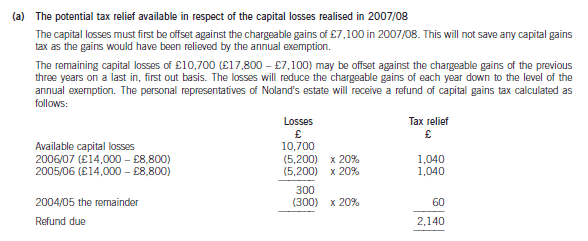
-
第8题:
(ii) State, with reasons, whether Messier Ltd can provide Galileo with accommodation in the UK without
giving rise to a UK income tax liability. (2 marks)
正确答案:
(ii) Tax-free accommodation
It is not possible for Messier Ltd to provide Galileo with tax-free accommodation. The provision of accommodation by an
employer to an employee will give rise to a taxable benefit unless it is:
– necessary for the proper performance of the employee’s duties, e.g. a caretaker; or
– for the better performance of the employee’s duties and customary, e.g. a hotel manager; or
– part of arrangements arising out of threats to the employee’s security, e.g. a government minister.
As a manager of Messier Ltd Galileo is unable to satisfy any of the above conditions. -
第9题:
6 Charles and Jane Miro, aged 31 and 34 years respectively, have been married for ten years and have two children
aged six and eight years. Charles is a teacher but for the last five years he has stayed at home to look after their
children. Jane works as a translator for Speak Write Ltd.
Speak Write Ltd was formed and began trading on 6 April 2006. It provides translation services to universities. Jane,
who ceased employment with Barnham University to found the company, owns 100% of its ordinary share capital
and is its only employee.
Speak Write Ltd has translated documents for four different universities since it began trading. Its biggest client is
Barnham University which represents 70% of the company’s gross income. It is estimated that the company’s gross
fee income for its first 12 months of trading will be £110,000. Speak Write Ltd usually agrees fixed fees in advance
with its clients although it charges for some projects by reference to the number of days taken to do the work. None
of the universities makes any payment to Speak Write Ltd in respect of Jane being on holiday or sick.
All of the universities insist that Jane does the work herself. Jane carries out the work for three of the universities in
her office at home using a computer and specialised software owned by Speak Write Ltd. The work she does for
Barnham University is done in the university’s library on one of its computers as the documents concerned are too
delicate to move.
The first set of accounts for Speak Write Ltd will be drawn up for the year ending 5 April 2007. It is estimated that
the company’s tax adjusted trading profit for this period will be £52,500. This figure is after deducting Jane’s salary
of £4,000 per month and the related national insurance contributions but before any adjustments required by the
application of the personal service companies (IR 35) legislation. The company has no other sources of income or
capital gains.
Jane has not entered into any communication with HM Revenue and Customs (HMRC) with respect to the company
and wants to know:
– When the corporation tax computation should be submitted and when the tax is due.
– When the corporation tax computation can be regarded as having been agreed by HMRC.
Charles and Jane have requested a meeting to discuss the family’s finances. In particular, they wish to consider the
shortfall in the family’s annual income and any other related issues if Jane were to die. Their mortgage is covered
by a term assurance policy but neither of them have made any pension contributions or carried out any other long
term financial planning.
Jane has estimated that her annual after tax income from Speak Write Ltd, on the assumption that she extracts all of
the company’s profits, will be £58,000. Charles owns two investment properties that together generate after tax
income of £8,500. He estimates that he could earn £28,000 after tax if he were to return to work.
The couple’s annual surplus income, after payment of all household expenditure including mortgage payments of
£900 per month, is £21,000. Charles and Jane have no other sources of income.
Required:
(a) Write a letter to Jane setting out:
(i) the arguments that HMRC could put forward, based only on the facts set out above, in support of
applying the IR 35 legislation to Speak Write Ltd; and
(ii) the additional income tax and national insurance contributions that would be payable, together with
their due date of payment, if HMRC applied the IR 35 legislation to all of the company’s income in
2006/07. (11 marks)
正确答案: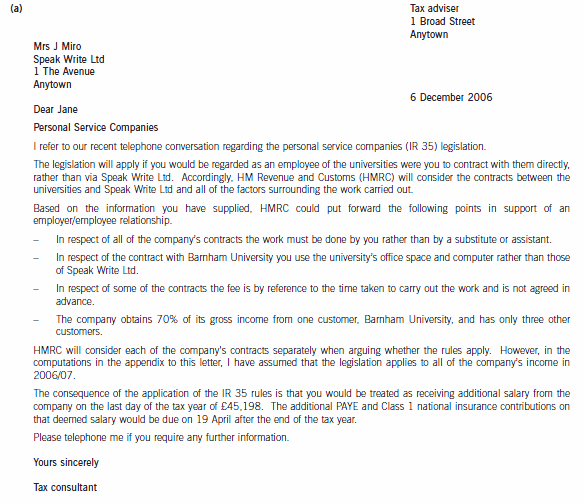
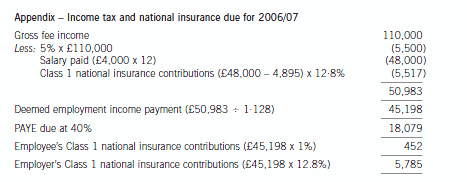
-
第10题:
听力原文:The tax return does not show accrued income.
(8)
A.The tax return is not shown in the income.
B.The income is not accurate in taxation.
C.The tax should be returned according to the income.
D.The tax return is not in accordance with the income that should be taxed.
正确答案:D
解析:单句意思为“纳税申报单不能反映应计收入”,D项意思与之接近。 -
第11题:
Income tax【个人所得税】
For many young Americans, graduating from college means finding a job, moving out of the dorm room and beginning to register one's annual earnings with the US government.
That last item is the law, though sometimes it's a hassle(难事)to obey.
Independent tax advisor Bob Gilbert calls the US income tax system "amazingly complicated". But he adds that "very little of the complicated tax law applies to young people who are just beginning their careers". According to Gilbert, 80 to 90 percent of Americans are not really burdened by the system's complications.
Still, all the numbers and forms can be a little confusing to those who are just starting their careers. Some pull out their calculators and try to do the math alone. Some use income tax software. Others just hand the whole responsibility over to tax firms like Gilbert's. According to income tax law expert Linda Beale, young people will often follow their parents' lead when filling their income forms.
"Young people who grow up in wealthy households typically use professional tax services because their parents have always done so," said Beale, a professor at Wayne State University in Michigan State.
"On the other hand, most poorer young people probably try to do their own taxes, unless they want a quick 'refund' with the help of a tax advisor".
In fact, obeying the law has its benefits. For one, many young people can expect a tax refund. This means that, over the course of the year, they have paid too much in monthly federal or state taxes and are entitled to the difference.
Bob Thalman, a 20-year-old university student, expects he will get a refund of about 100, which will probably go in the bank, or perhaps be used to pay for car insurance or credit card bills.
Thalman called the whole process a "hassle", but added that he didn't wat to test the law by not filling his income tax papers.
"I'm worried about what would happen if I failed to file," he said. "I know one individual who did not report his income tax for many years, and he's now in federal prison. I certainly don’t want that."
文章(16~22)
A college student with a part-time job is not required to file an income tax form.A.Right
B.Wrong
C.Not mentioned答案:C解析: -
第12题:
单选题Income tax rates are()to one's annual income.Arelated
Bdependent
Cbased
Dassociated
正确答案: C解析: 暂无解析 -
第13题:
(b) Explain the advantages from a tax point of view of operating the new business as a partnership rather than
as a company whilst it is making losses. You should calculate the tax adjusted trading loss for the year
ending 31 March 2008 for both situations and indicate the years in which the loss relief will be obtained.
You are not required to prepare any other supporting calculations. (10 marks)
正确答案:(b) The new business
There are two tax advantages to operating the business as a partnership.
(i) Reduction in taxable income
If the new business is operated as a company, Cindy and Arthur would both be taxed at 40% on their salaries. In
addition, employer and employee national insurance contributions would be due on £105 (£5,000 – £4,895) in respect
of each of them.
If the new business is operated as a partnership, the partners would have no taxable trading income because the
partnership has made a loss; any salaries paid to the partners would be appropriations of the profit or loss of the
business and not employment income. They would, however, each have to pay Class 2 national insurance contributions
of £2·10 each per week.
(ii) Earlier relief for trading losses
If the new business is operated as a company, its tax adjusted trading loss in the year ending 31 March 2008 would
be as follows: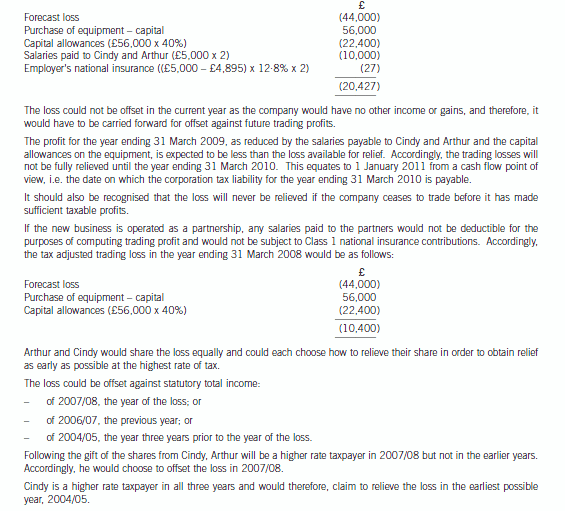
-
第14题:
(b) Peter, one of Linden Limited’s non-executive directors, having lived and worked in the UK for most of his adult
life, sold his home near London on 22 March 2006 and, together with his wife (a French citizen), moved to live
in a villa which she owns in the south of France. Peter is now demanding that the tax deducted from his director’s
fees, for the board meetings held on 18 April and 16 May 2006, be refunded, on the grounds that, as he is no
longer resident in the UK, he is no longer liable to UK income tax. All of the company’s board meetings are held
at its offices in Cambridge.
Despite Peter’s assurance that none of the other companies of which he is a director has disputed his change of
tax status, Damian is uncertain whether he should make the refunds requested. However, as Peter is a friend of
the company’s founder, Linden Limited’s managing director is urging him to do so, stating that if the tax does
have to be paid, then Linden Limited could always bear the cost.
Required:
Advise Damian whether Peter is correct in his assertion regarding his tax position and in the case that there
is a UK tax liability the implications of the managing director’s suggestion. You are not required to consider
national insurance (NIC) issues. (4 marks)
正确答案:
(b) Peter will have been resident and ordinarily resident in the UK. When such individuals leave the UK for a purpose other than
to take up full time employment abroad, they normally continue to still be so regarded unless their absence spans a complete
tax year. But, where someone intends to live permanently abroad or to do so for a period of at least three tax years, they may
be treated as non-resident and non-ordinarily resident from the day after the date of their departure, if they can provide
evidence to HMRC of that intention. Selling a residence in the UK and setting up home abroad will normally constitute such
evidence. However to retain non-resident status the intention must actually be fulfilled, and visits to the UK must not exceed
182 days in any tax year or average more than 90 days per year over a period of four tax years. Given that Peter would appear
to have several company directorships in the UK, it is possible that he might fail to satisfy the 90 day average ‘substantial
visits’ rule.
Even if Peter is classed as non-resident, any remuneration earned in the UK will still be liable to UK income tax, and subject
to PAYE, unless it is for duties incidental to an overseas employment, which is unlikely to be the case for fees paid to a nonexecutive
director for attending board meetings. Thus, income tax should still be deducted from the fees under PAYE. Where
PAYE should have been deducted from a director’s emoluments and it has not been, but the tax is nevertheless accounted
for by the company to HMRC, then to the extent that the tax is not reimbursed by the director, he will be treated as receiving
a benefit equivalent to the amount of tax. -
第15题:
(b) (i) Calculate Amanda’s income tax payable for the tax year 2006/07; (11 marks)
正确答案:

-
第16题:
(iii) The effect of the restructuring on the group’s ability to recover directly and non-directly attributable input
tax. (6 marks)
You are required to prepare calculations in respect of part (ii) only of this part of this question.
Note: – You should assume that the corporation tax rates and allowances for the financial year 2006 apply
throughout this question.
正确答案:(iii) The effect of the restructuring on the group’s ability to recover its input tax
Prior to the restructuring
Rapier Ltd and Switch Ltd make wholly standard rated supplies and are in a position to recover all of their input tax
other than that which is specifically blocked. Dirk Ltd and Flick Ltd are unable to register for VAT as they do not make
taxable supplies. Accordingly, they cannot recover any of their input tax.
Following the restructuring
Rapier Ltd will be carrying on four separate trades, two of which involve the making of exempt supplies such that it will
be a partially exempt trader. Its recoverable input tax will be calculated as follows.
– Input tax in respect of inputs wholly attributable to taxable supplies is recoverable.
– Input tax in respect of inputs wholly attributable to exempt supplies cannot be recovered (subject to the de minimis
limits below).
– A proportion of the company’s residual input tax, i.e. input tax in respect of inputs which cannot be directly
attributed to particular supplies, is recoverable. The proportion is taxable supplies (VAT exclusive) divided by total
supplies (VAT exclusive). This proportion is rounded up to the nearest whole percentage where total residual input
tax is no more than £400,000 per quarter.
The balance of the residual input tax cannot be recovered (subject to the de minimis limits below).
– If the de minimis limits are satisfied, Rapier Ltd will be able to recover all of its input tax (other than that which is
specifically blocked) including that which relates to exempt supplies. The de minimis limits are satisfied where the
irrecoverable input tax:
– is less than or equal to £625 per month on average; and
– is less than or equal to 50% of total input tax.
The impact of the restructuring on the group’s ability to recover its input tax will depend on the level of supplies made
by the different businesses and the amounts of input tax involved. The restructuring could result in the group being able
to recover all of its input tax (if the de minimis limits are satisfied). Alternatively the amount of irrecoverable input tax
may be more or less than the amounts which cannot be recovered by Dirk Ltd and Flick Ltd under the existing group
structure.
-
第17题:
3 Palm plc recently acquired 100% of the ordinary share capital of Nikau Ltd from Facet Ltd. Palm plc intends to use
Nikau Ltd to develop a new product range, under the name ‘Project Sabal’. Nikau Ltd owns shares in a non-UK
resident company, Date Inc.
The following information has been extracted from client files and from a meeting with the Finance Director of Palm
plc.
Palm plc:
– Has more than 40 wholly owned subsidiaries such that all group companies pay corporation tax at 30%.
– All group companies prepare accounts to 31 March.
– Acquired Nikau Ltd on 1 November 2007 from Facet Ltd, an unrelated company.
Nikau Ltd:
– UK resident company that manufactures domestic electronic appliances for sale in the European Union (EU).
– Large enterprise for the purposes of the enhanced relief available for research and development expenditure.
– Trading losses brought forward as at 1 April 2007 of £195,700.
– Budgeted taxable trading profit of £360,000 for the year ending 31 March 2008 before taking account of ‘Project
Sabal’.
– Dividend income of £38,200 will be received in the year ending 31 March 2008 in respect of the shares in Date
Inc.
‘Project Sabal’:
– Development of a range of electronic appliances, for sale in North America.
– Project Sabal will represent a significant advance in the technology of domestic appliances.
– Nikau Ltd will spend £70,000 on staffing costs and consumables researching and developing the necessary
technology between now and 31 March 2008. Further costs will be incurred in the following year.
– Sales to North America will commence in 2009 and are expected to generate significant profits from that year.
Shares in Date Inc:
– Nikau Ltd owns 35% of the ordinary share capital of Date Inc.
– The shares were purchased from Facet Ltd on 1 June 2003 for their market value of £338,000.
– The sale was a no gain, no loss transfer for the purposes of corporation tax.
– Facet Ltd purchased the shares in Date Inc on 1 March 1994 for £137,000.
Date Inc:
– A controlled foreign company resident in the country of Palladia.
– Annual chargeable profits arising out of property investment activities are approximately £120,000, of which
approximately £115,000 is distributed to its shareholders each year.
The tax system in Palladia:
– No taxes on income or capital profits.
– 4% withholding tax on dividends paid to shareholders resident outside Palladia.
Required:
(a) Prepare detailed explanatory notes, including relevant supporting calculations, on the effect of the following
issues on the amount of corporation tax payable by Nikau Ltd for the year ending 31 March 2008.
(i) The costs of developing ‘Project Sabal’ and the significant commercial changes to the company’s
activities arising out of its implementation. (8 marks)
正确答案:
(a) Nikau Ltd – Effect on corporation tax payable for the year ending 31 March 2008
(i) Project Sabal
Research and development expenditure
The expenditure incurred in respect of research and development will give rise to an enhanced deduction for the
purposes of computing the taxable trading profits of Nikau Ltd. The enhanced deduction is 125% of the qualifying
expenditure as Nikau Ltd is a large enterprise for this purpose.
The expenditure will reduce the profits chargeable to corporation tax of Nikau Ltd by £87,500 (£70,000 x 1·25) and
its corporation tax liability by £26,250 (£87,500 x 30%).
The budgeted expenditure will qualify for the enhanced deduction because it appears to satisfy the following conditions.
– It is likely to qualify as research and development expenditure within generally accepted accounting principles as
it will result in new technical knowledge and the production of a substantially improved device for use in the
industry.
– It exceeds £10,000 in Nikau Ltd’s accounting period.
– It relates to staff costs, consumable items or other qualifying expenditure as opposed to capital items.
– It will result in further trading activities for Nikau Ltd.
Use of brought forward trading losses
The development of products for the North American market is likely to represent a major change in the nature and
conduct of the trade of Nikau Ltd. This is because the company is developing new products and intends to sell them in
a new market. It is a major change as sales to North America are expected to generate significant additional profits.
Because this change will occur within three years of the change in the ownership of Nikau Ltd on 1 November 2007,
any trading losses arising prior to that date cannot be carried forward beyond that date.
Accordingly, the trading losses brought forward may only be offset against £158,958 ((£360,000 – £87,500) x 7/12)
of the company’s trading profits for the year. The remainder of the trading losses £36,742 (£195,700 – £158,958) will
be lost resulting in lost tax relief of £11,023 (£36,742 x 30%).
Tutorial note
The profits for the year ending 31 March 2008 will be apportioned to the periods pre and post 1 November 2007 on
either a time basis or some other basis that is just and reasonable. -
第18题:
(ii) Explain how the inclusion of rental income in Coral’s UK income tax computation could affect the
income tax due on her dividend income. (2 marks)
You are not required to prepare calculations for part (b) of this question.
Note: you should assume that the tax rates and allowances for the tax year 2006/07 and for the financial year to
31 March 2007 will continue to apply for the foreseeable future.
正确答案:
(ii) The effect of taxable rental income on the tax due on Coral’s dividend income
Remitting rental income to the UK may cause some of Coral’s dividend income currently falling within the basic rate
band to fall within the higher rate band. The effect of this would be to increase the tax on the gross dividend income
from 0% (10% less the 10% tax credit) to 221/2% (321/2% less 10%).
Tutorial note
It would be equally acceptable to state that the effective rate of tax on the dividend income would increase from 0%
to 25%. -
第19题:
(c) (i) Explain how Messier Ltd can assist Galileo with the cost of relocating to the UK and/or provide him with
interest-free loan finance for this purpose without increasing his UK income tax liability; (3 marks)
正确答案:
(c) (i) Relocation costs
Direct assistance
Messier Ltd can bear the cost of certain qualifying relocation costs of Galileo up to a maximum of £8,000 without
increasing his UK income tax liability. Qualifying costs include the legal, professional and other fees in relation to the
purchase of a house, the costs of travelling to the UK and the cost of transporting his belongings. The costs must be
incurred before the end of the tax year following the year of the relocation, i.e. by 5 April 2010.
Assistance in the form. of a loan
Messier Ltd can provide Galileo with an interest-free loan of up to £5,000 without giving rise to any UK income tax. -
第20题:
(ii) Write a letter to Donald advising him on the most tax efficient manner in which he can relieve the loss
incurred in the year to 31 March 2007. Your letter should briefly outline the types of loss relief available
and explain their relative merits in Donald’s situation. Assume that Donald will have no source of income
other than the business in the year of assessment 2006/07 and that any income he earned on a parttime
basis while at university was always less than his annual personal allowance. (9 marks)
Assume that the corporation tax rates and allowances for the financial year 2004 and the income tax rates
and allowances for 2004/05 apply throughout this question.
Relevant retail price index figures are:
January 1998 159·5
April 1998 162·6
正确答案:(ii) [Donald’s address] [Firm’s address]
Dear Donald [Date]
I understand that you have incurred a tax loss in your first year of trading. The following options are available in respect
of this loss.
1. The first option is to use the trading loss against other forms of income in the same year. If such a claim is made,
losses are offset against income before personal allowances.
Any excess loss can still be offset against capital gains of the year. However, any offset against capital gains is
before both taper relief and annual exemptions.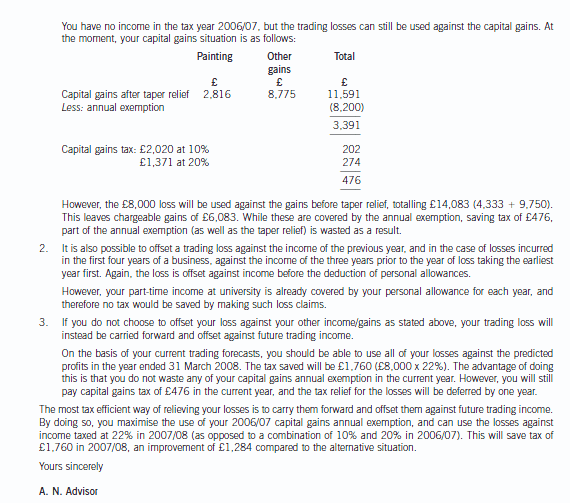
-
第21题:
3 The Stiletto Partnership consisted of three partners, Clint, Ben and Amy, who shared the profits of the business
equally. On 28 February 2007 the partners sold the business to Razor Ltd, in exchange for shares in Razor Ltd, with
each former partner owning one third of the new company.
The recent, tax adjusted, trading profits of the Stiletto Partnership have been as follows:
£
Year ended 30 June 2006 92,124
1 July 2006 to 28 February 2007 81,795
Clint, who was 65 on 5 October 2006, retired when the business was sold to Razor Ltd. He is now suggesting that
if the sale of the partnership, and his retirement, had been delayed until 30 April 2007, his total tax liability would
have been reduced. Clint’s only other income is gross pension income of £6,100 per year, which he began receiving
in the tax year 2005/06. Clint did not receive any salary or dividends from Razor Ltd. It is estimated that the
partnership’s tax adjusted trading profits for the period from 1 March 2007 to 30 April 2007 would have been
£20,760. Clint has overlap profits of £14,250 brought forward from when the partnership began trading.
Razor Ltd manufactures industrial cutting tools. On 1 July 2007, Razor Ltd will subscribe for the whole of the ordinary
share capital of Cutlass Inc, a company newly incorporated in the country of Sharpenia. It is intended that Cutlass
Inc will purchase partly finished tools from Razor Ltd and customise them in Sharpenia. It is anticipated that Cutlass
Inc’s annual profits chargeable to corporation tax will be approximately £120,000.
Ben and Amy will be the directors of Cutlass Inc, although Ben will not be involved in the company’s business on a
day-to-day basis. Amy intends to spend one or two weeks each month in the country of Sharpenia looking after the
company’s affairs. The remainder of her time will be spent in the UK. Amy has employment contracts with both Razor
Ltd and Cutlass Inc and her duties for Cutlass Inc will be carried out wholly in Sharpenia. Cutlass Inc will pay for
Amy’s flights to and from Sharpenia and for her husband and baby to visit her there twice a year. Amy is currently
UK resident and ordinarily resident.
The system of income tax and corporation tax in the country of Sharpenia is broadly similar to that in the UK although
the rate of corporation tax is 38% regardless of the level of profits. There is a double tax treaty between the UK and
Sharpenia based on the OECD model treaty. The clause in the treaty dealing with company residency states that a
company resident in both countries under domestic law will be regarded under the treaty as being resident only in the
country where it is effectively managed and controlled. Sharpenia is not a member of the European Union.
Required:
(a) (i) Calculate Clint’s taxable trading profits for the tax years 2006/07 and 2007/08 for both of the
alternative retirement dates (28 February 2007 and 30 April 2007). (3 marks)
正确答案:
-
第22题:
It's pretty easy for a beginner to report his or her income tax.A.Right
B.Wrong
C.Not mentioned答案:B解析: -
第23题:
Income Income may be national income and personal income. Whereas national income is defined as the total earned income of all the factors of production-namely, profits, interest, rent, wages, and other compensation for labor, personal income may be defined as total money income received by individuals before personal taxes are paid. National income does not equal GNP (Gross National Product) because the factors of production do not receive payment for either capital consumption allowances or indirect business taxes, both of which are included in GNP. The money put aside for capital consumption is for replacement and thus is not counted as income. Indirect taxes include sales taxes, property taxes , and excise taxes that are paid by businesses directly to the government and so reduce the income left to pay for the factors of production. Three-fourths of national income goes for wages, salaries, and other forms of compensation to employees. Whereas national income shows the income that the factors of production earn, personal income measures the income that individuals or households receive. Corporation profits are included in national income because they are earned. Out of these profits, however, corporation profit taxes must be paid to the government, and some money must be put into the business for expansion. Only that part of profits distributed as dividends goes to the individual; therefore, out of corporation profits only dividends count as personal income. The factors of production earn money for social security and unemployment insurance contributions, but this money goes to government (which is not a factor of production), not to individuals. It is therefore part of national income but not part of personal income. On the other hand, money received by individuals when they collect social security or unemployment compensation is not money earned but money received. Interest received on government bonds is also in this category, because much of the money received from the sale of bonds went to pay for war production and that production no longer furnishes a service to the economy. The money people receive as personal income may be either spent or saved. However, not all spending is completely voluntary. A significant portion of our income goes to pay personal taxes. Most workers never receive the money they pay in personal taxes, because it is withheld from their paychecks. The money that individuals are left with after they have met their tax obligations is disposable personal income. Disposable income can be divided between personal consumption expenditures and personal savings. It is important to remember that personal saving is what is left after spending. It can be easily seen from this passage that the government levies tax on()
- A、corporation profits
- B、every individual even though his income is very low
- C、those who work in joint ventures
- D、those who work in government departments
正确答案:A
